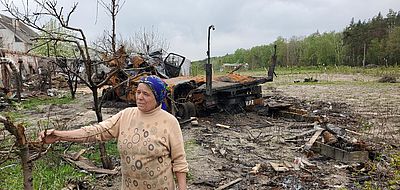Living under, with and against Occupation. Experiences and strategies of accommodation in war-time Ukraine from the Russian annexation of Crimea until today (2014-22)
04. Juli | 14:00
The LimSpaces project « Living with Uncertainty. Strategies of adaptation and horizons of expectations in Ukraine and Moldova »
is holding a round table discussion on July 4 at the Centre Marc Bloch from 2pm -4pm on:
Living with Occupation: Investigating and analyzing everyday survival in Russia-occupied areas of Ukraine (2014-22).
With Yulia Abibok (WZB-CMB), Dr. Natalia Kudriavtseva (A. Krupp Wiss. Kolleg Greifswald/ Pedag. U. Krivyi Rih), Dr. Sophie Lambroschini (CMB-CERCEC).
Discussant: Dr. Masha Cerovic (EHESS-CMB).
The attack against Ukraine has placed parts of the population of Ukraine under a state of occupation by the Russian armed forces, acting directly or indirectly through proxy authorities. Since 2014, 7% of Ukraine’s territory had been subjected to some form of occupation regime, as Crimea was annexed and eastern parts of the Donbas were taken over by the self-proclaimed Peoples’ republics of Donetsk and Lugansk. The full-scale invasion by the Russian army in February 2022 has brought even more parts of Ukraine, east, south and centre under control of Russian forces. Although some initially occupied territories have been liberated, currently about one - fifth of Ukraine is under Russian occupation, according to president V. Zelensky. Millions of Ukrainians are trapped by this occupation, and by the fighting and violence that accompany it. Russia is forcing its own military, political, ideological and economic order over these populations. The testimonies and accounts of life under occupation share certain characteristics but also reveal differences. What are the different occupation regimes imposed by Russia? How do people adjust to this regime in their everyday lives? How do local Ukrainan authorities and critical public services deal with the situation? How do relations with the central state and with Kyiv-controlled areas evolve? What is collaboration? How is resistance possible? How are solidarities and loyalties expressed, and sovereignities redefined? A round-table brings together three scholars of Ukraine with field knowledge of Ukraine’s occupied territories to explore the social and political dynamics and consequences of violent occupation.
The session is organized jointly with the "Mobilities, migrations, recomposition of spaces" research group of the CMB.
The working language will be English.
Address: Centre Marc Bloch, Friedrichstr. 191, Berlin 10117, Salle Germaine Tillion, July 4, 2022. 2pm-4pm. For remote attendance via zoom please register at anmeldung@cmb.hu-berlin.de
Photo caption and credit: Yahidne, Chernihivska obl. Under occupation in March. Photo VostokSOS/DRA May 2022 mission @yevhenvasyliev
Kontakt
Sophie Lambroschini
sophie_lambro ( at ) yahoo.com
